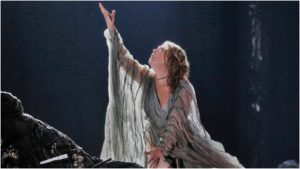
Metropolitan Opera 2017-18 Review – Norma: Opening Night is a Triumph for Sondra Radvanovsky
By Kim FeltkampThe Metropolitan Opera launched its 2017-18 season with its usual flash and sparkle, ushering celebrities onto the red carpet for their turn at the step and repeat as droves of opera fans in their black tie best bustled under the crystal chandeliers. The house was abuzz from the very start: patrons chattering in excitement even after the lights went down.
Major Anticipation
Cancellations have been a theme of the summer for the company, with major cast changes shifting attention away from what is usually one of opera’s biggest nights all around the world. Interestingly, this very production of “Norma” was the result of massive behind-the-scenes cancellations, with superstar soprano Anna Netrebko withdrawing from a previous commitment to take on the famed role of “Norma.”
More interesting was the question surrounding the actual production of the famed Bel Canto opera, the Met’s artistic images always in flux and its opening night choices often setting the tone for most of the season. Over the past few seasons, the opening night productions have been all about experimentation with both “Tristan und Isolde (2016)” and “Otello (2015),” straying from the classical and traditional. Those productions were met with mixed reviews, the critics often noting that their respective directors’ desires for innovation seemed a bit curtailed by an unwritten need to appeal to a more traditional audience.
But with his “Norma,” director David McVicar has shifted things toward a more classical approach in the visuals, though his directing of the actors added great depth to the understanding of the work. McVicar’s message was loud and clear to the opera world: the operas themselves are masterworks that only require a skilled director to highlight their themes, elaborate concepts be damned.
Less is More
Robert Jones’ sets garnered instant and well-deserved applause. His first forest set accurately portrayed the lifestyle of the druids and pulled the audience into the magic and mystery of Norma’s religion. The trees drifted inward and outward between scenes, sometimes hemming in the characters and other times evoking a sense of endlessness. Norma’s home emerged from beneath the forest scene, all earth tones and furs. Paule Constable’s lighting perfectly enhanced each set, weaving ambiance and realistic detail into Robert Jones’ work.
David McVicar’s production was an intriguing mix of extreme stillness and highly-specific physicality. His staging kept many of the “park and bark” moments you’d expect from a traditional production of “Norma,” but when the characters moved, emotional and historical content bled through with energetic abandon. Norma’s body language remained highly animalistic throughout, visually joining her with the nature around her and foreshadowing her unexpected decisions in the second half of the opera. Pollione came across as an obvious abuser. Not only did he constantly put down the women’s religion, citing his own as superior, but he physically mistreated them. He held both Adalgisa and Norma aggressively, pushing them around and touching them repeatedly against their will. Adalgisa moved away from Pollione when he approached, closing in on herself and shaking as though she expected him to attack her. Adalgisa’s timidity only faded in the moments when she was alone with Norma or interacting with Norma’s sons. This lens cast new meaning on the relationship between Pollione and the women, complicating what is usually a straight-forward love triangle. It also brought the focus to the relationship between Norma and Adalgisa, going so far as to have Adalgisa in Norma’s spotlight during “Casta diva.” This eliminated some of the dull aspects relating to their rivalry over Pollione and made Norma’s anger more about Pollione taking Adalgisa away against her will than Norma’s jealousy. It successfully avoided the pitfall for a trope and made for an emotionally riveting and complex story.
Dream Cast
The cast did not disappoint. Sondra Radvanovsky soared through the treacherously difficult role, bringing pathos and beauty to every moment she spent onstage. Her floated high notes captivated the audience and her angry, declamatory moments held all the fury and cut that the character demands. The room seemed to hold its breath through the entirety of her “Casta diva,” one of the most delicious moments in all of opera. She clearly matched the strength and artistic prowess of the divas of old who have tackled this role, joining their ranks as another one of the great singers of all time.
Joyce DiDonato brought her detailed artistry and flexible mezzo to Adalgisa, skillfully matching Radvanovsky in their duets. Their time onstage together remained the most exciting and musically satisfying of the evening. Joseph Calleja brought vocal heft and physical power to Pollione, although he wavered slightly on the high notes in his Act one aria.
Matthew Rose brought a touching rawness to Oroveso and Michelle Bradley’s warm Clotilde was a vocal standout.
Finally, the Met Orchestra was in top form last night under the emphatic baton of maestro Carlo Rizzi, playing with finesse and passion throughout the famous Bel Canto opera.
Overall, the Met’s opening night was a success and hearkens to a season of beautiful artistry, great music, and moving performances.


